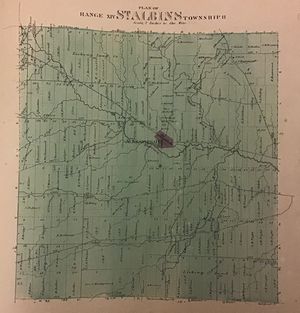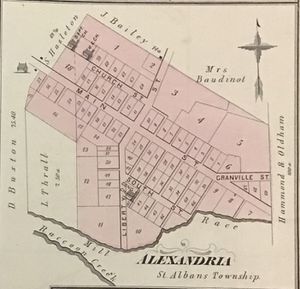St. Albans Township
St. Albans Township—centrally located in the eastern half of Licking County—lies south of Liberty Township, west of Granville Township, north of Harrison Township, and east of Jersey Township.
The topography of St. Albans Township is dominated by Racoon Creek and its tributaries. The many runs that feed into Racoon Creek as it crosses the township from the northwest to the southeast, creating a series of flat low-lying bottoms, was once covered with thick forests. The forests gave way to farmland during the phase of European settlement. The township has one village, Alexandria, near its geographic center. [1]
Contents
Moundbuilders and Native American settlement
There were at least a dozen surviving Native American mounds and three enclosures in the township at the beginning of the twentieth century. [2] The largest mound rose to as much as eighteen feet in height, but was damaged by an excavation conducted in 1830. [3]
Early European Settlement
The first European settler, John Cook Herron, built a cabin in St. Albans in 1807. Though the Herron family would eventually move to Newark, they were followed by a series of other settlers in 1808-1809 [4]. In 1813, the township was created by subdividing Granville Township. The area that became Jersey Township was also included with St. Albans at that time. [5]
Alexandria
Alexandria village was organized and planned by a man named Alexander DeVilbiss in 1830, and the name derives from the founder. Born in Maryland 1780, Alexander inherited part an estate at the death of his father that included Black slaves. DeVilbiss, a religious man, came to realize the wrongness of slavery and freed the slaves in his possession, sold his land in Maryland and came West to Ohio with his family around 1819. DeVilbiss bought 300 acres in St Abans. DeVilbiss operated a mill near the site of the village from 1820. The residents of the township wanted to have a more concentrated place of commerce and DeVilbiss centrally located mill was a logical choice. The DeVilbiss home was on South Liberty Street. Unfortunately, Alexander DeVilbiss died in 1831, so he did not have long to enjoy the town he had founded. [6].
References
- ↑ Hill, N., History of Licking County, (1881), 588
- ↑ Mill, W. Archaeological Atlas of Ohio, (1914), 45
- ↑ Hill, N., History of Licking County, (1881), 588
- ↑ Alexandria and St. Albans Township, Licking County, Ohio, (1952), 20-21
- ↑ Hill, N., History of Licking County, (1881), 588
- ↑ Alexandria and St. Albans Township, Licking County, Ohio, (1952), 29-31

